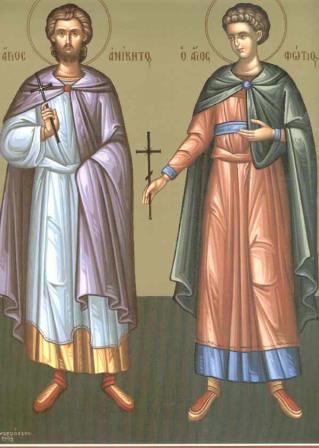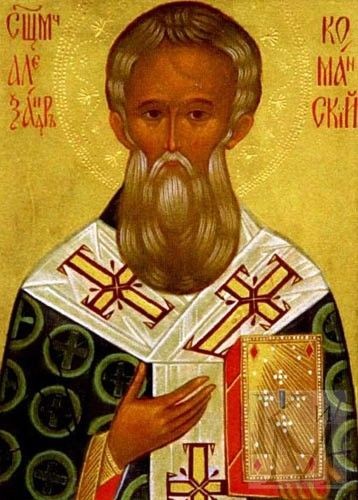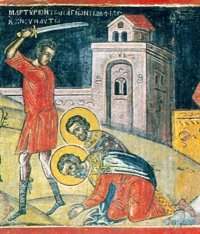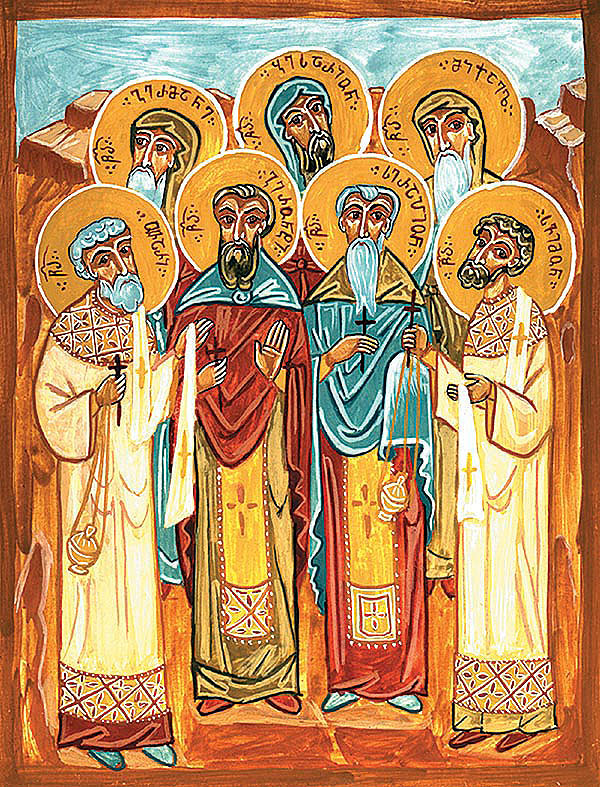|
|
The Holy Martyrs Anicetas and Photius The Emperor Diocletian at one time visited the city of Nicomedia with the evil intention of utterly exterminating the Christians there. But, when he began his merciless torture of the Christians, St Anicetas, one of the governors of the city, presented himself before him and courageously confessed before the Emperor his faith in Christ the Lord, God incarnate in the flesh for our salvation. Anicetas also denounced the worship of idols as that of deaf and dumb stones, unworthily worshipped by ignorant men. The furious Emperor commanded that his tongue be cut out, but Anicetas, by the power of God, continued to speak. Then a lion was let loose on him, which fawned about him. At that moment, the Temple of Hercules fell down. Photius, a kinsman of Anicetas", seeing the wonders and his kinsman"s endurance, embraced him, confessed that he himself was a Christian and cried out to the Emperor: "You should be ashamed, you idolater; your gods are nothing!" The Emperor ordered that he be beheaded immediately, but the executioner, lifting up his hand against St Photius, gave himself a blow with his sword and died. After harsh torture, the two of them were thrown into prison, where they remained for three years. They were then taken out and thrown into an enormous burning furnace. Many other Christians, men, women and children, went into the flames voluntarily after them, and the prayers of the Christians were heard rising from the flames, thanking God for their death by martyrdom. They all suffered in about 305. St Anicetas and St Photius are invoked in the prayers at the blessing of oil and water. The Emperor Diocletian at one time visited the city of Nicomedia with the evil intention of utterly exterminating the Christians there. But, when he began his merciless torture of the Christians, St Anicetas, one of the governors of the city, presented himself before him and courageously confessed before the Emperor his faith in Christ the Lord, God incarnate in the flesh for our salvation. Anicetas also denounced the worship of idols as that of deaf and dumb stones, unworthily worshipped by ignorant men. The furious Emperor commanded that his tongue be cut out, but Anicetas, by the power of God, continued to speak. Then a lion was let loose on him, which fawned about him. At that moment, the Temple of Hercules fell down. Photius, a kinsman of Anicetas", seeing the wonders and his kinsman"s endurance, embraced him, confessed that he himself was a Christian and cried out to the Emperor: "You should be ashamed, you idolater; your gods are nothing!" The Emperor ordered that he be beheaded immediately, but the executioner, lifting up his hand against St Photius, gave himself a blow with his sword and died. After harsh torture, the two of them were thrown into prison, where they remained for three years. They were then taken out and thrown into an enormous burning furnace. Many other Christians, men, women and children, went into the flames voluntarily after them, and the prayers of the Christians were heard rising from the flames, thanking God for their death by martyrdom. They all suffered in about 305. St Anicetas and St Photius are invoked in the prayers at the blessing of oil and water.The Hieromartyr Alexander, Bishop of Comana He lived in the town of Comana near Neocaesarea as a simple charcoal-burner. When the Bishop of Comana died, St Gregory of Neocaesarea, the Wonderworker (Nov. 17th), was invited to preside over the Council to choose a new bishop. At the Council there were both clergy and laymen. They were unable to come to agreement on one person, estimating the candidates they selected according to their outward worth and behaviour. St Gregory told them that they must not give so much weight to the outward impression as to the soul and the spiritual aptitude. Then some wag called out mockingly: "Then let"s choose Alexander the charcoalburner as bishop!", and there was general laughter. St Gregory asked who this Alexander was. Thinking that his name would not have come before the Council except by the providence of God, he commanded that he be brought. Being a charcoal-burner, he was black with soot and in rags, and his appearance provoked further mirth in the Council. Then Gregory took him aside and asked him to tell the truth about himself. Alexander told him that he had been a Greek philosopher, enjoying great honour and position, but that he had set it all aside, demeaned himself and made himself as a fool for Christ from the time that he had read and understood the Holy Scriptures. Gregory commanded that he be bathed and clad in new clothes, then went into the Council with him and, before them all, began to examine him in the Scriptures. All were filled with amazement at the wisdom and grace of Alexander"s words, and were quite unable to recognise the former charcoal-burner in this wise man. With one voice, they chose him as bishop, and he received the love of his flock for his holiness, his wisdom and his goodness. He died a martyr for Christ under Diocletian. He lived in the town of Comana near Neocaesarea as a simple charcoal-burner. When the Bishop of Comana died, St Gregory of Neocaesarea, the Wonderworker (Nov. 17th), was invited to preside over the Council to choose a new bishop. At the Council there were both clergy and laymen. They were unable to come to agreement on one person, estimating the candidates they selected according to their outward worth and behaviour. St Gregory told them that they must not give so much weight to the outward impression as to the soul and the spiritual aptitude. Then some wag called out mockingly: "Then let"s choose Alexander the charcoalburner as bishop!", and there was general laughter. St Gregory asked who this Alexander was. Thinking that his name would not have come before the Council except by the providence of God, he commanded that he be brought. Being a charcoal-burner, he was black with soot and in rags, and his appearance provoked further mirth in the Council. Then Gregory took him aside and asked him to tell the truth about himself. Alexander told him that he had been a Greek philosopher, enjoying great honour and position, but that he had set it all aside, demeaned himself and made himself as a fool for Christ from the time that he had read and understood the Holy Scriptures. Gregory commanded that he be bathed and clad in new clothes, then went into the Council with him and, before them all, began to examine him in the Scriptures. All were filled with amazement at the wisdom and grace of Alexander"s words, and were quite unable to recognise the former charcoal-burner in this wise man. With one voice, they chose him as bishop, and he received the love of his flock for his holiness, his wisdom and his goodness. He died a martyr for Christ under Diocletian.Soldier-martyrs of Crete
Martyrs Pamphilus and Capito The Martyrs Pamphylos and Kapiton were beheaded by the sword in the locale of Oliurea near Constantinople. The Martyrs Pamphylos and Kapiton were beheaded by the sword in the locale of Oliurea near Constantinople.Venerable Pallamon of EgyptThe Venerable Palamon, guide of the Venerable Pachomius, was tonsured at the beginning of the Fourth Century in Egypt.
Sts. Sergius and Stephen, monks
Monk-martyrs Gerontius, Serapion, Germanus, Bessarion, Michael, and Simeon of Garesja, slain by the Lekians (1851) Throughout the 18th and 19th centuries the Dagestanis were continually raiding and pillaging the Davit-Gareji Wilderness. They destroyed churches and monasteries, stole sacred objects, and tortured and killed many of the monks who labored there. A Dagestani army invaded the Davit-Gareji Wilderness in the summer of 1851. They looted the Davit-Gareji Lavra and carried off many of the monastery’s sacred treasures and books. Then they took many of the monks captive and tortured a few of the most pious... Throughout the 18th and 19th centuries the Dagestanis were continually raiding and pillaging the Davit-Gareji Wilderness. They destroyed churches and monasteries, stole sacred objects, and tortured and killed many of the monks who labored there. A Dagestani army invaded the Davit-Gareji Wilderness in the summer of 1851. They looted the Davit-Gareji Lavra and carried off many of the monastery’s sacred treasures and books. Then they took many of the monks captive and tortured a few of the most pious... |